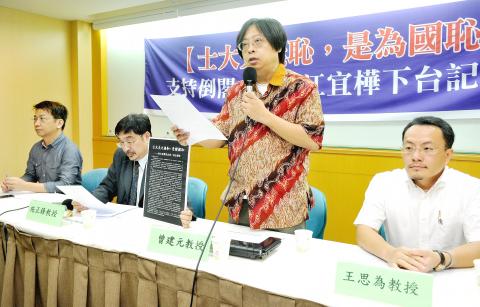Hundreds of academics yesterday called on Premier Jiang Yi-huah (江宜樺) to step down for his poor performance as head of the Cabinet and for violating the Constitution.
The academics issued a joint appeal titled “The shamelessness of intellectuals is a national disgrace,” in which they listed the “four mistakes” they said Jiang has committed.
They refused to refer to him as him as the premier in the appeal, calling him “Mr Jiang Yi-huah” because he is “no longer qualified for the title,” they told a press conference in Taipei.

Photo: Chien Jung-fong, Taipei Times
Jiang had neither tried to stop the illegal wiretaps in a “political plot” against President Ma Ying-jeou’s (馬英九) rivals — Legislative Speaker Wang Jin-pyng (王金平) and Democratic Progressive Party (DPP) caucus whip Ker Chien-ming (柯建銘) — nor advised Ma against waging an internal battle within the Chinese Nationalist Party (KMT), the academics said.
They also accused him of speaking in contempt of the legislature — a serious breach of the constitutional spirit of the separation of powers, the statement said, adding that the premier has refused to apologize to the legislature over the comment, leading to the current stalemate between the executive and legislative branches of government.
“While the no-confidence motion is unlikely to pass, it is important to hold responsible individuals accountable for the political strife in September because responsible politics is what democracy is all about,” Nanhua University assistant professor Steve Wang (王思為) told the press conference.
Aside from the news conference organized by Taiwan Forever Association (台灣永社), in which they issued the appeal, the academics also held a separate press conference simultaneously yesterday morning.
Jiang’s claim that a failed no-confidence motion would represent public confidence in the Cabinet was “shameless,” Chung Hua University associate professor Tseng Chien-yuan (曾建元) said at the second event.
Tseng also rebutted a common criticism of the DPP’s proposal, saying that a no-confidence motion would be a responsible countermeasure with the least cost against the executive branch’s unilateral and authoritative policy as well as a good solution to break a political gridlock.
The motion has two implications for the Ma administration, National Dong Hwa University professor Shih Cheng-feng (施正鋒) said.
“First, it sends a warning to Ma and tells him that he is not an emperor and he cannot do whatever he wants. Second, it is a warning to Jiang that he cannot expect to climb up the political ladder with the way he governs now,” Shih said.

The Chinese military has built landing bridge ships designed to expand its amphibious options for a potential assault on Taiwan, but their combat effectiveness is limited due to their high vulnerability, a defense expert said in an analysis published on Monday. Shen Ming-shih (沈明室), a research fellow at the Institute for National Defense and Security Research, said that the deployment of such vessels as part of the Chinese People’s Liberation Army (PLA) Navy’s East Sea Fleet signals a strong focus on Taiwan. However, the ships are highly vulnerable to precision strikes, which means they could be destroyed before they achieve their intended

About 4.2 million tourist arrivals were recorded in the first half of this year, a 10 percent increase from the same period last year, the Tourism Administration said yesterday. The growth continues to be consistent, with the fourth quarter of this year expected to be the peak in Taiwan, the agency said, adding that it plans to promote Taiwan overseas via partnerships and major events. From January to June, 9.14 million international departures were recorded from Taiwan, an 11 percent increase from the same period last year, with 3.3 million headed for Japan, 1.52 million for China and 832,962 to South Korea,

The Taiwan Experience Education Program (TEEP) has funded short-term internships in Taiwan for more than 4,500 young people from more than 40 countries since 2015, with the goal of attracting and retaining international talent, the Ministry of Education said yesterday. Fifty-five colleges launched 514 projects this year, including in fields such as semiconductors, artificial intelligence, medicine and biotechnology, green energy, and sustainability, it said. The program provides research and practical internships in Taiwan for two to six months, and offers cultural exchange and networking opportunities, the ministry said. For example, National Formosa University’s Embedded System and Autopilot Laboratory developed two solar-powered drones in

SOVEREIGNTY: The rigs show that Beijing ‘rejects Taiwan’s jurisdiction’ by building in areas where Taipei demands permission to build or alter installations Chinese oil rigs have been sighted just 26 nautical miles (42km), from Taiwan’s exclusive economic zone (EEZ) near Pratas Island (Dongsha Island, 東沙島), posing a threat to Taiwan’s sovereignty if left unchallenged, a brief published by the Jamestown Foundation on Tuesday said. Pratas Island, 444km from Kaohsiung, is northeast of the South China Sea and houses a Taiwanese garrison. The brief, titled “Rigging the Game: PRC Oil Structures Encroach on Taiwan’s Pratas Island” — referring to the People’s Republic of China — analyzed photographs and said that Beijing’s tools to pressure Taiwan now include oil rigs. “Oil rigs now constitute part of Beijing’s